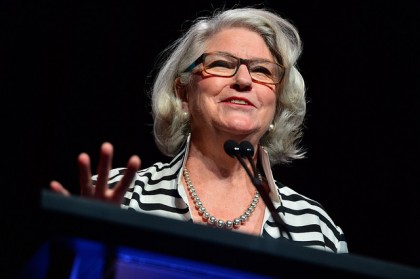Popularity of ‘Downton’ creates embarrassment of riches in ‘Masterpiece’ slot
BEVERLY HILLS, Calif. — The success of Downton Abbey, whose fifth season has been set for Jan. 4, has created a novel problem for PBS: too many programs to fit into the Sunday-night slot occupied by Masterpiece.
It’s possible that PBS might schedule some of the excess series at another hour or on another day. But there are no plans to do so for now, according to Masterpiece EP Rebecca Eaton.

The producers of PBS’ Masterpiece are “going to die trying to find the next ‘Downton,’” Eaton told TV critics. (Photo: Rahoul Ghose, PBS)
“We have been working with PBS to figure out what to do with all this programming because we are bursting the banks of Masterpiece Sunday nights at 9 o’clock,” she said. “There are more programs than we could possibly fit into 9 o’clock. So we’re trying to figure out how to make hay while this particular sun is shining.”
Eaton presided over a panel on Downton Abbey Tuesday night at the summer Television Critics Association press tour. Before TV journalists began questioning four actors from the large cast — Michelle Dockery, Joanne Froggatt, Allen Leech and Laura Carmichael — and executive producer Gareth Neame, Eaton showed short clips from three multiepisode series intended for broadcast on Masterpiece in 2015:
- Poldark, based on the historical novel by Winston Graham and set at the turn of the 19th century;
- Wolf Hall and sequel Bring Up the Bodies, from Dame Hilary Mantel, who won the Booker Prize for each of the novels; and
- Indian Summers, described as a cross between Downton Abbey and Jewel in the Crown. The show is initially set in 1930s India, with the characters revisited every few years until 1947, when the subcontinent becomes a nation. Each season will consist of ten one-hour episodes.
“There never will be another Downton Abbey, but we are swinging for the fences, and we are going to die trying to find the next Downton,” Eaton said.
With the return of Viking Cruises and Ralph Lauren, all sponsorships have been sold out, Eaton said. The season premiere will be preceded by a one-hour special, “The Manners of Downton Abbey,” hosted by on-set historian Alastair Bruce.
Neame said the new season will take place six months after the conclusion of Season Four. He said he had no plans to end the series after a specific number of seasons and would like to continue producing the show as long as it remains popular with viewers.
Neame disagrees with some critics who said the series slipped last season. “You’re always learning,” Neame said. “On balance, I really loved Season Four. I think it is one of the strongest seasons we’ve had.”
The series received 12 Emmy nominations for its fourth season.
Following the session, Eaton told Current that the embarrassment of production riches is mainly the result of the huge popularity of Downton Abbey and Sherlock, which inspired the production of other historical dramas, and a trend toward producing series with more episodes. In the past, British series rarely exceeded six episodes per season.
Meanwhile, there are signs that the popularity of Downton Abbey, even after four seasons, has yet to peak.
Earlier in the day, PBS President Paula Kerger said ratings for the series were up 16 percent this year over last. She said the increase supported PBS’s decision to premiere new seasons of the series in January, rather than in September, when it is seen in the U.K.
Kerger also pointed out that “Masterpiece” ratings rose 24 percent in two years. Meanwhile, ratings for Sunday dramas overall have grown 14 percent over last year, she said.
Finding another Downton Abbey won’t be easy, she said. The series, she said, “is one of those events that I think many people would refer to as lightning in a bottle. . . . It hit at just the right time and captured the public’s attention.”
Kerger said PBS has expanded drama on Sunday nights to find more series that would not only be popular with viewers but also serve as an entry point to other series on the PBS schedule.
Eaton also announced a new Mystery! series for 2015. “Grantchester Mysteries,” written by James Runcie, son of the former Archbishop of Canterbury, features a 1950s-era crime-solving vicar.






